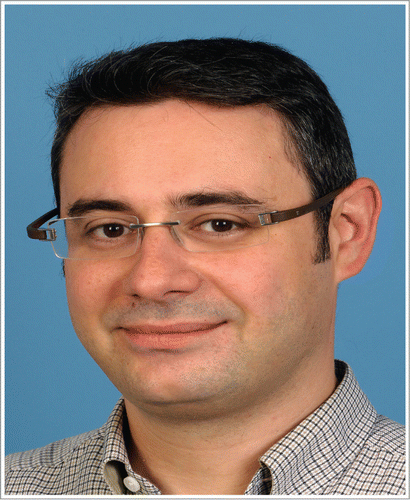Did You Have a Particular Career Wish as a Child?
Since my elementary school years, I envisioned that my future profession should involve human health, and strive at its improvement or at the prevention of disease. Although I had already fostered a humanistic ideal, at the time I was still not sure whether I could implement my aspirations as a front-line healthcare practitioner or as a biomedical researcher. Or both.
About George N Belibasakis. Prof. Belibasakis is the Head of Section of Oral Microbiology and Immunology at the Center of Dental Medicine, University of Zürich, Switzerland. He studied Dentistry at the Aristotle University of Thessaloniki, Greece (1999), attained a PhD in Oral Microbiology at Umeå University, Sweden (2004), an MSc in Periodontology at Queen Mary University of London (QMUL), UK (2009), and a Postgraduate Certificate in Academic Practice, also at QMUL (2009). He worked as post-doctoral research associate at King's College London Dental Institute (2005), and as a Lecturer in Oral Biology at QMUL (2005–2009), before his recruitment at the Center of Dental Medicine of the University of Zürich, Switzerland (2009). During this time, he completed his Habilitation (Venia Legendi) in Oral Microbiology and Immunology (2012), and was appointed Professor in the same discipline, at the Medical Faculty of the University of Zürich (2014). He has authored more than 80 peer-reviewed publications, and reviewed manuscripts for more than 70 different dental and biomedical journals. His editorial duties include being Associate Editor for BMC Microbiology and BMC Infectious Diseases, and Editorial Board member for Journal of Dental Research, Archives of Oral Biology, Molecular Oral Microbiology, Journal of Oral Microbiology, Clinical Oral Implants Research, Oral Health and Preventive Dentistry, Microbial Pathogenesis and Virulence. He is the Guest-Editor of the present Special Focus issue in “Oral Infections.” In 2012 he received the prestigious “Anthony Rizzo Young Investigator Award” of the International Association for Dental Research (IADR). He is a member of the IADR since his time as an undergraduate dental student, and has developed a strong commitment in its activities ever since. As an educator he teaches in undergraduate and postgraduate dental curricula, and supervises research theses at Bachelors, Masters and Doctoral levels. As Head of the Section of Oral Microbiology and Immunology, he is responsible for managing the group's administrative tasks, educational and research activities. His research expertise lies in the microbial etiology and inflammatory pathogenesis of oral diseases, with a particular focus in periodontal and peri-implant infections. Experimental host-microbe interaction models are the primeline of his research in etiopathogenesis, complemented by clinical studies aiming at identifying host and microbial markers for early disease diagnosis, and links between oral infection and systemic inflammation.

When did you first get interested in science and when did you decide to become an academic?
I grew up in a very research-oriented environment. My father Nikolaos was University Professor of Veterinary Medicine, and my mother Sofia was Director of a state Veterinary Research Institute. I guess somewhere along the way between childhood and adolescence, and having visited several times my parents professional environments, I decided to pursue my ideals for the advancement of human health via an academic career.
Tell us about the different stages of your education and experiences at university
I commenced my University education by studying Dentistry in Greece, an important step to understanding and treating oral disease. Through my PhD studies in Sweden, I developed my independent research skills. By attaining a Lectureship in the UK I developed my skills as an educator, but also advanced my clinical specialty skills, by completing a postgraduate program in Periodontology. In my current post in Switzerland I was able to combine and apply these earlier acquired skills, but also establish my managerial skills by becoming departmental Head.
Tell us about the most important stages of your professional career
My first academic position, a teaching/research Lectureship in London, was the first crucial stage in my career. It marked my transition from being a post-doctoral fellow to a Lecturer. It enabled me to engage in a broader range of academic activities, including education and curriculum coordination, starting up my own independent lab activity and research student supervision. Thus it facilitated my consolidation as an academician. The next most important check-point was becoming a Professor and departmental Head in Zürich, which enabled me to manage larger academic Units with diverse personnel needs, and opened new horizons for multiple and multi-disciplinary research projects.
How many people work in your Department?
At present, the Section I am heading consists of 9 staff members, and is complemented by Masters and Doctoral students, as well as visiting Post-doctoral fellows.
What areas or topics does your research lab currently focus on?
Our primary research focus is the study of the etiology and pathogenesis of oral infectious diseases. The research activities include both in vitro and clinical studies. The individual subjects are a) the identification of host and microbial markers of oral diseases, for the development of applicable preventive, diagnostic and therapeutic modalities, b) the understanding of the ecology and structure of oral biofilms in vitro, their interactions with the host, and their responses to antimicrobial strategies, and c) the deciphering of inflammatory pathways activated in oral diseases, using in vitro host-bacteria interaction models, d) the search for links between oral infections and systemic disorders.
What makes a good mentor?
Commitment, patience, being a good listener, giving clear instructions, encourage and be willing to discuss the student's independent suggestions. It is important for the mentor to appreciate that the student is in their lab to learn how to perform research, and hence a research education should serve as a “driving license” for greater scientific achievements in the future.
What is your philosophy in scientific pursues?
Clinically-oriented biological research: a bridge between basic and clinical science is important to ensure that discoveries made in the laboratory aim at solving a practical clinical question. Therefore, being able to understand both worlds is crucial to fulfill such a translational role.
